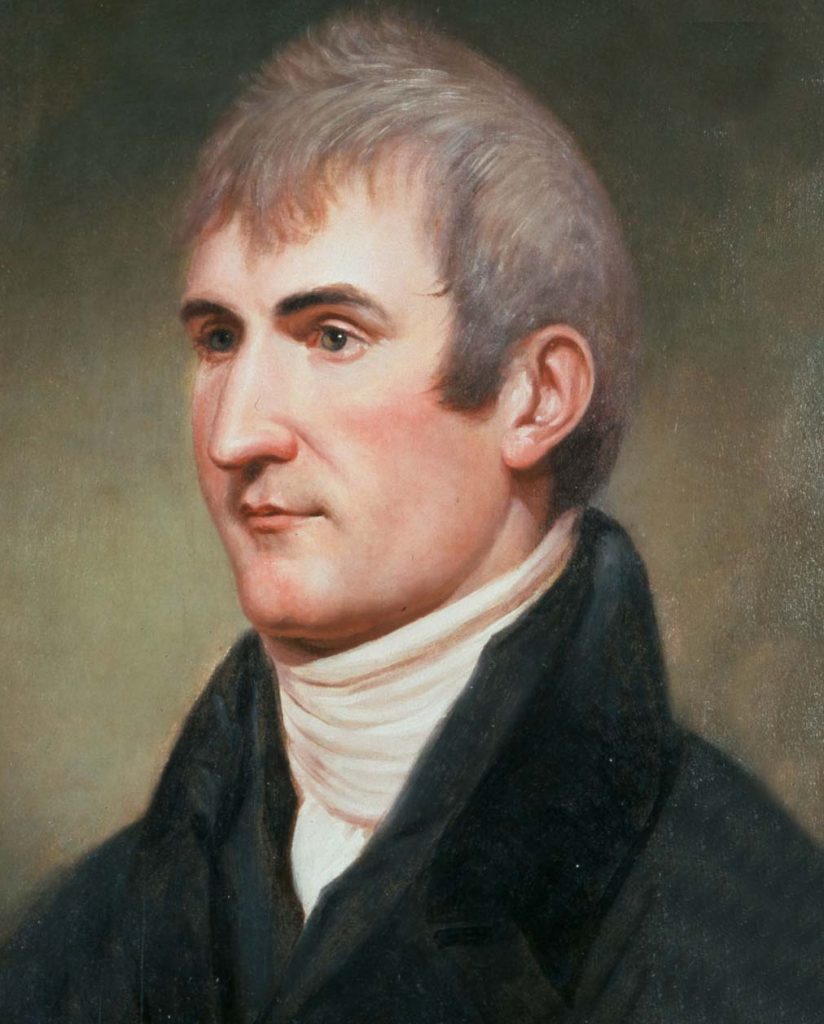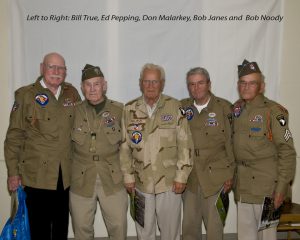It is the year 1804, and your leader is Captain Meriwether Lewis, front runner of the Corps of Discovery appointed by President Thomas Jefferson himself. Fueled by his hatred for the British and enamored by glory and adventure, Lewis joined the militia in 1794 to suppress the Whiskey Rebellion, and then “served in the Army under General ‘Mad Anthony’ Wayne, where he notably witnessed several Indian nations sign the Treaty of Greenville on 3 August 1795.”1

Unfortunately, his reputation in the Army was tarnished when he was “court-martialed for conduct unbecoming of an officer,” and although he was acquitted with honor, the consequences of his unruly behavior reshaped his military career, ending his dreams of glory on the battlefield.2 He was reassigned to another unit, and from then on filled mundane administrative positions. Despite the deviation in his career path, he continued to excel, reaching the pinnacle of his administrative career when he became the secretary to President Thomas Jefferson. The President had known Lewis since he was a boy, and believed that he possessed the knowledge and skills necessary to lead a successful expedition from the trans-Mississippi region to the Pacific Ocean.3
These were the instructions received by Meriwether Lewis from Thomas Jefferson: “The object of your mission is to explore the Missouri river, & such principal streams of it, as, by its course & communication with the water of the Pacific Ocean may offer the most direct & practicable water communication across this continent, for the purposes of commerce.”4 Captain Lewis’s mission was to search for a new route to the Pacific; and in addition to mapping waterways such as the Missouri river, he and his team were to traverse swaths of uncharted territory. This was dangerous and unfamiliar terrain, home to many Native American tribes, some of whom they would rely on to guide them, and others who were hostile and unsympathetic to their cause. Captain Lewis would attempt to promote diplomatic relationships with these tribes, while annotating all aspects of topography and demography to send back to the President. This was his dream come true, another adventure, a chance to relish in the glory of new discoveries and an opportunity to impress the President. Captain Meriwether Lewis and his members of the Corps of Discovery would become one of the first civilized men to explore and endure the perils of the western frontier.
The expedition party “consisted of about 45 soldiers, boatmen, and woodsmen, not to mention Lewis’s dog Seaman, and a slave named York… who was considered an equal member of the troop.”5 The expeditioners endured strenuous traveling conditions, particularly dealing with mosquitoes in the summer: “their bites make the horses nearly frantic and leaves Lewis’s dog howling in pain. To escape their attacks, they tried greasing themselves by day, standing in the smoke of campfires in the evening and retreating under netting at night.”6 Investigating new landmarks was exciting, but even the slightest misstep could send them hurdling to their deaths. In fact, Lewis nearly died when “he climbed on to a jagged outcropping of rock at the top of some bluffs, when he lost his footing three hundred feet above the swift current of the Missouri River, which, in 1804, flowed directly below.”7

Captain Meriwether Lewis’s journey was filled with invisible threats, but the most unpredictable dangers came while exploring the Missouri River. Its waters were deceptive, leading travelers to believe that it was easily maneuverable. Its calm surface and murky waters masked the fast currents and debris that could send uprooted trees catapulting into a boat, leaving only seconds for the crew to avoid a major catastrophe. The sandbars were constantly shifting, which created a hazard for boats that were thought to be docked safely: “One night the guard awakened them all with the news that the sandbar on which they had camped was sinking. The river was carving it away, and the company barely loaded their gear into the boats and pulled away before the bank under which they had kept the boats collapsed. By the time they reached shore the sandbar was completely gone.”8 The possibility of death lurked around every corner, and soon another formidable threat was discovered while they traveled by foot, namely a vicious new species of bear, which they called the white bear, or grizzly bear. These bears were aggressive and likely to attack humans: “One bear took ten bullets, five of these through the lungs, yet swam to a sandbar more than halfway across the Missouri and survived twenty minutes before dropping. It weighed between five hundred and six hundred pounds, was eight feet seven inches long, five feet ten inches around its breast, and had claws, or ‘talons,’ four and three-eighths inches long.”9 Captain Lewis decided it was in everyone’s best interest to avoid any unnecessary confrontations with the bears. It was not worth the risk of life and limb to hunt these beasts for game. Despite the frequent mishaps caused by mother nature amidst the dangers of the wild, Captain Lewis and his troupe successfully made it to the Pacific Ocean.
The final leg of their journey was just as grueling. They traveled back to St Louis through the winter, and with food and supplies stretched thin, they resorted to a diet of dog meat. On their way back to St Louis, Captain Lewis sent his best hunter, George Drouillard, to scout the Maria River valley, when he suddenly spotted a group of Indians spying on his comrade in the distance. The fear of being robbed and the thought of losing all his important documents turned into courageous action that drove him to intervene with these suspicious onlookers before they had the opportunity to take Drouillard hostage. Captain Lewis was able to negotiate his peaceful intentions by giving them gifts, but remained uneasy when they decided to set up camp with these surprise visitors. His instincts were right. They had turned in for the night with the Blackfeet Indians, an aggressive band of Native Americans known in those parts for stealing, and even killing. “Lewis was awakened by the noise and, seeing his rifle missing, followed the Indian and ordered him to lay it down. He complied, and Lewis ordered his men to refrain from killing him, but when he and some of the other Blackfeet began to drive off the explorers’ horses, Lewis took off in pursuit, without his shot pouch, and threatened to shoot if they did not halt. When they turned, Lewis shot one in the belly, but the Blackfeet returned fire before crawling behind a rock. In the end, the Blackfeet left behind four of their own horses and got away with only one from the explorers.”10 Lewis and his team have had many close calls, but this was the first serious altercation that resulted in a firefight. Luckily, all members of the Corps of Discovery escaped death, unscathed.

Captain Meriwether Lewis and the Corps of Discovery were the “first to have traversed the American West and returned with voluminous reports.”11 They survived over eight thousand miles and were able to “describe about 180 plants and 125 animals that had not been reported to scientists.”12 They fought for their lives as they hiked through harsh terrain, navigated unpredictable waterways, fended off vicious animals, and narrowly escaped death from the hostile Blackfeet Indians. When Captain Lewis lost touch with civilization, many people thought that he and the rest of his crew had perished. On 23 September 1806 everyone was amazed when they arrived in St. Louis after two years and four months with only one casualty.13 Captain Lewis successfully completed Thomas Jefferson’s requests to explore the Missouri river and map out its waterways, found the Pacific Ocean, provided documentation of the lands they crossed and the Native American tribes they interacted with along the way to establish peace on behalf of the United States government. 14 His courage, curiosity, and determination to accomplish the task set forth by President Thomas Jefferson enabled him to push the boundaries of exploration. He defied all limitations of the civilized world, making him one of the most ground-breaking explorers in the United States of America.
- Dictionary of Literary Biography vol. 183: American Travel Writers 1776-1864, January 1997, s.v. “Meriwether Lewis,” by Rob J. Brault. ↵
- Cyclopedia of World Authors, January 2003 s.v. “Meriwether Lewis,” by Joseph Byrne. ↵
- Cyclopedia of World Authors, January 2003 s.v. “Meriwether Lewis,” by Joseph Byrne. ↵
- Thomas Jefferson, “Instructions to Meriwether Lewis,” Instructions to Meriwether Lewis (August 2017), 422. ↵
- Keira Stevenson, “The Expedition of Lewis & Clark,” Expedition of Lewis & Clark (August 2017): 1. ↵
- Ann Rogers, Lewis and Clark in Missouri (Colombia: University of Missouri Press, 2002), 49. ↵
- Ann Rogers, Lewis and Clark in Missouri (Colombia: University of Missouri Press, 2002), 34. ↵
- Dictionary of Literary Biography vol. 183: American Travel Writers 1776-1864, January 1997, s.v. “Meriwether Lewis,” by Rob J. Brault. ↵
- Dictionary of Literary Biography vol. 183: American Travel Writers 1776-1864, January 1997, s.v. “Meriwether Lewis,” by Rob J. Brault. ↵
- Dictionary of Literary Biography vol. 183: American Travel Writers 1776-1864, January 1997, s.v. “Meriwether Lewis,” by Rob J. Brault. ↵
- Encyclopedia of Geography, 2010, s.v “Lewis and Clark Expedition,” by John Allen. ↵
- Funk & Wagnalls New World Encyclopedia, 2017, s.v “Lewis and Clark Expedition.” ↵
- Ann Rogers, Lewis and Clark in Missouri (Colombia: University of Missouri Press, 2002), 88, 90. ↵
- Ann Rogers, Lewis and Clark in Missouri (Colombia: University of Missouri Press, 2002), 89-90. ↵



51 comments
Timothy ODekirk
I love the topic of Lewis and Clark and the idea of Westward Expansion. I commented on this article previous, and I am glad I have the opportunity to be able to do so again. The most interesting aspect of the Lewis and Clark expansionist to me is their encounters with Grizzly bears. The fact that they probably saw grizzly bears as these ferious beasts, where they really are not like that today is interesting to me. This was a great article and was well worth the second read through.
Arianna Kennet
I have not actually heard of Meriwether Lewis before, probably because I am not much of a history fan so I never took the time to actually find out more. It is interesting to see how Meriwether Lewis along with his crew were the first people to discover the Western side of the United States. Something new I just learnt about American history. It is also great to see how they went through horrible obstacles but still survived through it.
Luis Morales
This was a great article. The article was well written and illustrated about the expedition of Meriwether throughout the West. I find Westward expansion very and it is something that I always look forward to read about. The story of Meriwether Lewis is interesting because he and his crew were the one of the first colonists to explore the western part of the United States. The fact that they discovered much more than land is amazing. Lewis and Clark gave us our modern world today. Great job!
Erin Vento
I really liked this story because it was all about Meriwether Lewis. You never ever hear about him on his own, and even in the beginning of the article I was trying to figure out why I knew that name and then I realized that he was the Lewis from Lewis and Clark. It was really informative and told exciting stories about the dangers he came across. Good job!
Regina De La Parra
What a great article! I found it incredible how hard it was for Lewis and Clark and the exploration they ventured on and all of the things they were able to find! I really liked how the writer portrayed all of the problems they faced and could face and how they overcame these challenges. Great research. I can see you took time and effort to complete this article. Great job Fumei!!
Iris Henderson
The story of Captain Meriwether Lewis and the Corps of Discovery was one filled with action. As I understand it, Lewis, under the request of President Thomas Jefferson, led the Corps of Discovery on the first civilized expedition of the Western Frontier. It was interesting to read the several account in which the group struggled in the wilderness. The most astonishing was the story of the sandbars on which they rested, disappearing almost right beneath them.
Rafael Lopez-Rodriguez
What a great story the author has told in this article! After reading that the military career was going to go downhill after that being his dreams was what kept me going on to keep reading this article!! I found it to be like a plot twist because going from what could be a problem for Lewis to discovering plants and other species not known to scientists is a great achievement for society. And the fact that him and his troops survived over 180 miles in a risky river was great to read!
Hanadi Sonouper
This was definitely a well told story on a true revenant. The article was well written and illustrated about Meriwether Lewis’s great expedition of exploration through the west. I found it overall very insightful and intriguing, the fact that he was able discover much more than land is amazing, because of his expedition the scientific world became broader with over 180 plants and 125 animals. Lewis and Clark gave us our modern day geography, despite their many terrifying and almost deadly encounters with bears, Indians and mother nature itself. Overall the article was well told, and the graphics helped the reader understand more about the key points stated.
Jason Garcia
Lewis and Clark are known as the frontiersmen that explored the new land that the united states acquired. I learned about their journey in elementary school and always wondered what the details were and how difficult the task was for Lewis and his team. This article provided us with just that. details on how dangerous the journey was as well as his background and motivations for embarking on such a historic moment in the united states history.
Edgar Ramon
It’s really hard to imagine, in our safety, how perilous these adventures were. Today it might be easy to see Meriwether Lewis and Clark as some white-whigged guys who drew maps. In reality, these guys survived some harsh conditions and were truly adventurers. Not speaking the language of tribes far west, not knowing if they’ll kill you or help, and bears and wolves. It wasn’t like Bear Grylls who will go into the jungle for 3 days, which honestly sounds frightening, it was literally diving into the uncharted for months.